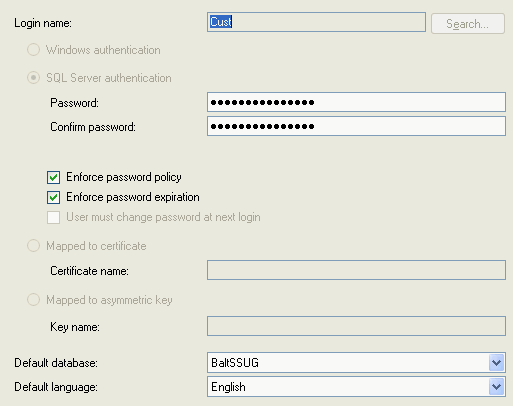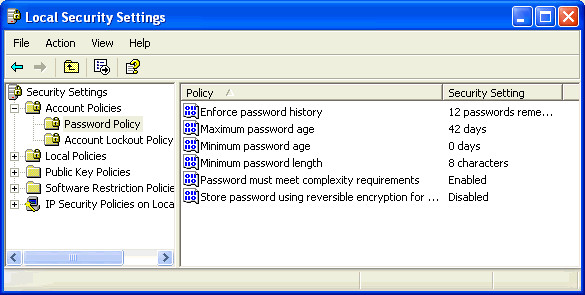By: Jeremy Kadlec | Comments (1) | Related: 1 | 2 | 3 | 4 | > Auditing and Compliance
Problem
For some reason your web site is up, but none of the data is loading on your web site? Is your SQL Server up and running? Are you able to access the data with either your Windows account or sa? What does your SQL Server error log report? What is the culprit?
Solution
Chances are if the SQL Server error log reports messages of:
Logon Login failed for user 'loginname'. Reason: The password of the account has expired. [CLIENT: <named pipe>]
Then the password for the login used in your web application has expired. SQL Server 2005 introduced 'Enforce password policy' and/or the 'Enforce password expiration' configurations which use the local policies for password length, complexity and expiration. Depending on how Active Directory, the local policies and your rights are setup, these parameters can be reviewed and changed to dictate how SQL Server uses configurations.
Where can I find the login properties?
- Open Management Studio and the object browser.
- Navigate to the Security > Logins folder.
- Find the login you are interested in reviewing.
- Right click on the login and select 'Properties' option.
- On the General tab, review the 'Enforce password policy' and the 'Enforce password expiration' configurations.

Where can I find Window password policies?
Under Windows Admistrator Tools lauch Local Security Policy to review the local policies on the machine or you can type "secpol.msc" in the Windows Run box. Below is what you will see as the options.

Next Steps
- Review your logins to ensure you are aware if they are using the Enforce password policy and/or the Enforce password expiration configurations.
- Based on initial research, these configurations apply to all editions of SQL Server 2005 and later from Express to Enterprise.
- Setup an alert to capture when this event occurs to correct it immediately or determine another means to reset the passwords so these policies do not impact your applications.
- For additional information about the Enforce password policy and/or the Enforce password expiration configurations, reference the Password Policy article in SQL Server Books Online.
- For additional SQL Server security information check out these tips:
About the author
 Jeremy Kadlec is a Co-Founder, Editor and Author at MSSQLTips.com with more than 300 contributions. He is also the CTO @ Edgewood Solutions and a six-time SQL Server MVP. Jeremy brings 20+ years of SQL Server DBA and Developer experience to the community after earning a bachelor's degree from SSU and master's from UMBC.
Jeremy Kadlec is a Co-Founder, Editor and Author at MSSQLTips.com with more than 300 contributions. He is also the CTO @ Edgewood Solutions and a six-time SQL Server MVP. Jeremy brings 20+ years of SQL Server DBA and Developer experience to the community after earning a bachelor's degree from SSU and master's from UMBC.This author pledges the content of this article is based on professional experience and not AI generated.
View all my tips






